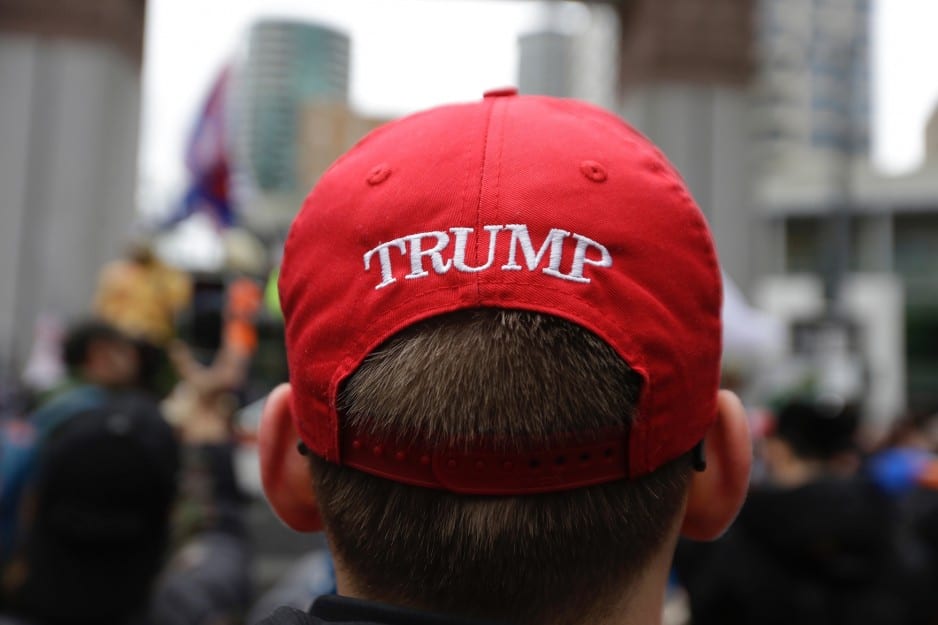
Why Trump’s Supporters Haven’t Abandoned Him
by Darryl Lorenzo Wellington | May 5, 2017 1:53 pm
Just 100 days into his presidency, Americans no longer expect President Donald Trump to keep the promises that got him elected. He walked back his promises on China, delivered nothing on his pledge to create infrastructure jobs, and—instead of “draining the swamp”—filled his cabinet with billionaires tied to corporate interests. The policies he has supported would do real harm to some of his staunchest supporters—white men without a college degree. Yesterday’s House vote on the American Health Care Act, also known as Trumpcare, will kick millions off their insurance. And he has proposed the elimination of half of the federal programs designed to help workers in coal country, and flirted with trade wars.
Nevertheless, 96 percent of the people who voted for Trump say they’d make the same decision today.
When I was growing up—in the 1970s, in the deep South—I struggled to understand why some low-income white Southerners voted against their own interests. They dismissed unions, and supported politicians that let their states lag behind the rest of the country in every indices of health, livelihood, and employment. They routinely supported candidates who opposed everything from access to affordable childcare, to unemployment benefits and investing in good jobs, to Medicaid expansion today.
But now I realize they’re not voting for policy. They’re voting for white privilege.
White privilege runs deep in America, and it still shapes white concepts of social standing and entitlement. Those entitlements can be symbolic—for example, the power that whites have in the South to maintain Confederate emblems with public prominence and high esteem. They can also be very literal, as with public policies that help whites build and sustain wealth while keeping doors of opportunity closed to blacks (think redlining, predatory lending, unequal access to higher education, and lack of investment in communities of color). That helps explain why black people in poverty have higher death rates than white people in poverty.
Perhaps because it plays such a central role in life in America, “white privilege” is not a comfortable phrase to say—not now, and certainly not in my childhood. Back then, Southerners only used this term—or its counterpart, “white supremacy”—to indicate that someone supported the Ku Klux Klan.
Most white Americans still prefer to define racism in those overt terms. It’s a convenient approach that limits discussion of racism to bygone “whites only” signs and burning crosses, and that argues inequality in our schools ended in 1954 with the Brown v. Board of Education Supreme Court decision. Few people—and even fewer white people—ever spoke the way famed basketball coach Greg Popovich did recently when he called out white privilege for what it really is:
If you were born white, you automatically have a monstrous advantage educationally, economically, culturally in this society and all the systemic roadblocks that exist, whether it’s in a judicial sense, a neighborhood sense with laws, zoning, education. We have huge problems… that are very complicated, but take leadership, time, and real concern to try to solve… People don’t really want to face it.
Our most pernicious social ills—the ones that create the privilege that Popovich described, and that many of Trump’s voters cling to—are rooted in policies that were designed to target people of color. We can measure racism by the impact of redlining and toxic mortgages. We can see it in the justice system, where black defendants receive twice as severe sentences as whites convicted of the same crimes. We can find it in classrooms that are still highly segregated, leaving children of color in schools that receive dramatically fewer resources.
America is essentially a racist nation—riddled by racial markers—that is levying its harshest economic and psychological toll on the 1 in 3 African American children and more than 1 in 4 Hispanic children who live in poverty.
Trump appeals to a strain of American racism every time he calls for a border wall, or calls inner cities “a disaster,” or swears he’ll ban Muslims from entering the country. That is what many of his voters—who are disproportionately likely to hold dehumanizing views of black people—want.
By backing Trump, conservatives have coalesced around maintaining a racially divided nation, and so progressives must now coalesce against it. Decisively.
Unfortunately, liberal politicians hoping to woo white voters have also skirted acknowledging white privilege, out of fear that talk about race will strain coalitions. Even the progressive hero Bernie Sanders was slow to talk about racial disparities in America at the beginning of his presidential campaign—before Black Lives Matter activists protested at his rallies. Silence concerning white privilege is a form of complicity. It’s the hypocritical denial of reality experienced by blacks that fosters disunity between minorities and white progressives, and discourages minority voters.
The time has come for whites who understand what white privilege means—and who know in their hearts that they want no part of it—to join people of color in a way which is neither compromised nor complicit. Then, through shared power, people of color and white progressives can grow our political strength.
This article first appeared on Talk Poverty.
